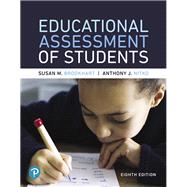Educational Assessment of Students offers information about the basics of educational measurement and step-by-step instructions on how to use and construct formative and summative assessments for classroom teaching. The text provides complete coverage of educational assessment, including developing plans that integrate teaching and assessment; using formative assessment strategies and providing effective feedback to students; crafting objective, performance, and portfolio assessments; evaluating students and discussing evaluations with parents; and interpreting state-mandated tests and standardized achievement tests.
Also available with MyLab Education
MyLab™ is the teaching and learning platform that empowers you to reach every student. By combining trusted author content with digital tools and a flexible platform, MyLab personalizes the learning experience and improves results for each student. MyLab Education helps teacher candidates bridge the gap between theory and practice–better preparing them for success in their future classrooms.
Note: You are purchasing a standalone product; MyLab does not come packaged with this content. Students, if interested in purchasing this title with MyLab Education, ask your instructor to confirm the correct package ISBN and Course ID. Instructors, contact your Pearson representative for more information.
If you would like to purchase both the physical text and MyLab Education search for:
0134806972 / 9780134806976 Educational Assessment of Students plus MyLab Education with Pearson eText -- Access Card Package
Package consists of:
- 0134807030 / 9780134807034 MyLab Education with Pearson eText -- Access Card -- for Educational Assessment of Students
- 0134807073 / 9780134807072 Educational Assessment of Students










